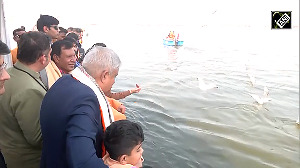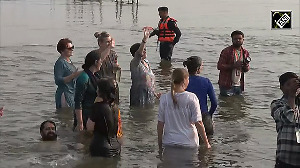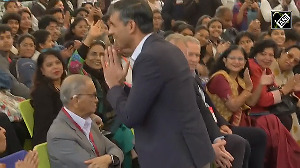Diplomatic observers and South Asia experts in the US do not believe that two of India's major concerns that Prime Minister Dr Manmohan Singh brought up with President Obama on Afghanistan, during his state visit in November and again recently on the sidelines of the Nuclear Security Summit have been alleviated during the summit between Obama and Afghan President Hamid Karzai.
Instead, these observers and experts said that India's plea to the US to eschew a premature withdrawal from Afghanistan and warning not to allow for the reintegration of the Taliban as part of the Afghan government far from being heeded had in a sense been shrugged aside and the only embrace of Dr Singh's advice was the legitimacy and credibility accorded Karzai after the tensions following the controversial presidential elections and the recent brouhaha following Obama visit and Karzai's subsequent angry response to the apparent rebuke he had been subjected to.
On the withdrawal by US forces from Afghanistan beginning July 2011, Obama in putting a spin on but nonetheless indicating that this withdrawal was still on the cards, said at his joint news conference with Karzai that "what I have said is, is that having put in more troops over the last several months in order to break the momentum of the Taliban, that beginning in 2011, July, we will start bringing those troops down and turning over more and more responsibility to Afghan security forces that we are building up."
"But we are not suddenly, as of July 2011, finished with Afghanistan," he said. "In fact, to the contrary, part of what I've tried to emphasize to President Karzai and the Afghan people, but also to the American people, is this is a long-term partnership that is not simply defined by our military presence."
Obama said, "I am confident that we're going to be able to reduce our troop strength in Afghanistan starting in July 2011," but reiterated that "after July 2011, we are still going to have an interest in making sure that Afghanistan is secure."
But Dr Singh and Indian officials, including National Security Adviser Shiv Shankar Menon, who met here with his US counterpart Rtd. Gen.Jim Jones had warned that the training of Afghan forces would not be complete by that time and Afghanistan would not be secure.
Diplomatic observers also said that all indications were that Obama intent with keeping to his July 2011 time frame also seems to have embraced bringing in some Taliban elements into the reconciliation and reintegration effort and complete gone along with this proposed strategy by Karzai, even though the Afghan leader had earlier said no Taliban leaders would be part of this reintegration process but now seems to have changed course on his earlier contention on only to include low and middle-level Taliban.
When he was asked about this Karzai argued that "Afghanistan is seeking peace because through military means alone we are not going to get our objectives of bringing stability and peace to Afghanistan and the defeat of terrorism."
He rationalized that "there are thousands of the Taliban who are not ideologically oriented, who are not part of al Qaeda or other terrorist networks, or controlled from outside in any manner troublesome to us."
Karzai said, "There are thousands of them who are country boys who have been driven by intimidation or fear caused by at times misconduct by us, or circumstances beyond heir control or our control."
"Those within the Taliban leadership structure who are not part of al Qaeda, or the terrorist networks, or ideologically against Afghanistan's progress and rights and constitution, democracy, the place of women in the Afghan society, the progress that they've madeand are willing to march ahead with the rest of the people and their country towards a better future for Afghanistan, are welcome."
But what the diplomatic observers and experts were most chagrined over was how Obama in responding to the question by the Afghan journalist who complained that Pakistan was the root of all problems in Afghanistan seemingly gave Islamabad a pass, simply saying that Islamabad seems to now recognize that India is not the existential threat but the extremism and militancy within its own borders and at the crossroads of Pakistan and Afghanistan.
Sumit Ganguly, professor of political science at Indiana University at Bloomington, who has become one of the most trenchant critics of the Obama administration's South Asia policy, particularly vis-à-vis India, complained that "Obama has done little or nothing to reach out to India."
"Even this latest response to the Afghan journalist's question (see separate story) seems to echo the claim of the (Pakistan president Asif Ali) Zardari regime that it is doing all it can to crush the Taliban,"
Ganguly argued that "Obama's formulation that previous Pakistani regimes were in cahoots with the Taliban but have now turned a page is exactly what Islamabad, nay GHQ in Rawalpindi, would have us believe. Even Hillary Clinton's statements in the wake of the abortive bombing in New York City do not offer huge comfort to the Indians."
"Even after the emergence of incontrovertible evidence linking the would-be bomber to training in Pakistan, she warned that 'severe consequences' would ensue if an attack in the US was linked to Pakistan," he said.
Ganguly asked, "How much more evidence do we need of continued Pakistani dalliance with terrorists before the administration decides to adopt a more unequivocal stance on the matter?"
He asserted that "at this stage, instead of pleading with the US to take the new regime's continued willingness to hunt with the hounds and run with the hares in Musharraf-like fashion, India should take its own steps to deal with Pakistan and decide on what role it wants to play in Afghanistan, now and in the future."
Ganguly said, "If India wants to be taken seriously as a great power it needs to act like one and not turn on bended knee to an administration that has evinced only cosmetic interest in India's role in the region and beyond. More photo-ops with Obama and dulcet words from the White House will do little to protect and advance India's national security interests."
Lisa Curtis, who heads the South Asia Program at the conservative Washington think tank, the Heritage Foundation, said, "There was a notable difference in the tone of Obama's comments on Pakistan's role in fighting terrorism during his news conference compared to Secretary (of State, Hillary) Clinton during her interview with '60 Minutes' earlier. President Obama decided to accentuate the positive while Secretary Clinton emphasized the work that Pakistan still needs to do."
"That does not mean that Secretary Clinton misspoke with her remarks, however. I believe her comments were part of a calculated message to Pakistan that the Times Square bombing attempt was a game-changer and that the US would be less patient with Pakistani reluctance to fully tackle the terrorism problem in the country," Curtis, an erstwhile South Asia analyst with the Central Intelligence Agency, said.
Walter Andersen, associate director of the South Asian Studies Program at the Johns Hopkins University's School of Advanced International Studies, said, "The issue brought up by the correspondent from Ariana TV reflects a widely held view in Afghanistan that Pakistan is part of the problem."
Andersen, an ex-State Department veteran, who final stint before retirement from the diplomatic service was as head of the South Asia division of the State Department's Intelligence and Research Bureau, said, "That is of course true because both the Afghan Taliban and the Pakistani Taliban are located in Pakistan and often get help from various Punjabi based radical groups like the Lashkar-e-Tayiba and Jaish-e-Muhammad."
"And, there is no doubt that Pakistan has struck out against the Pakistani Taliban, in part because they attacked the Pakistani state and military and the ISI," he added.
But Andersen, argued that "Pakistan has been rather reluctant to attack the safe havens of the Afghan Taliban and the Haqqani network in North Waziristan and in Balochistan," because it wants to continue using this group to destabilize Afghanistan and maintain its strategic depth against India.
He said that "President Obama's cautious answer is because Pakistan is indispensable for cutting off the cross-border movement (of the Taliban and other extremist groups) and to provide a venue for supply for the NATO forces in Afghanistan."
Andersen said evidently this was why Obama had "noted the increased military action against the Pakistani Taliban, but was relatively silent about the lack of action against the Afghan Taliban based in Pakistan, and perhaps even support for them by some elements in the Pakistani government."
"Privately, maybe they speak about this since they US clearly knows about this lack of action, and this irritation by the US occasionally breaks out into the open with some statements of US officials in positions that give them access to highly classified intelligence," he said.
Andersen said, "Obama should have said Pakistan needs to move against all major terrorist groups because they have in fact links to each other. A selective policy for tactical reasons only perpetuates the problem."

Referring to the reintegration of the Taliban by Karzai and the lack of action against the Afghan Taliban by Pakistan, he argued "that these so-called tactical deals tend to turn into Frankenstein monsters, as happened in the case of the Pakistani Taliban and of course, the LeT, who orchestrated the attack on Mumbai".
Andersen said, "President Obama may have said that Pakistan is beginning to recognize that India was not their only concern, but I am not sure what the operational implications are."
"Pakistan still sees India as the existential threat and continues to be unwilling to move a large part of its best units from the east to the west because of this," he said.







 © 2025
© 2025